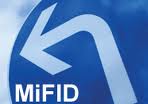By
Stanley Epstein
The original Markets in Financial Instruments Directive (MiFID) came into force in November 2007. MiFID brought competition to the trading procedures in the European Union. Under MiFID investment firms could operate throughout the EU on the basis of the ‘authority’ of their home EU Member State. MiFID also introduces a range of investor protection measures. In short MiFID became the cornerstone of the EU’s regulation of financial markets.
During 2011 the European Commission agreed to a proposal for the revision of MiFID. The revisions are intended to take account new developments in the trading situation since 2007 including new technological developments as well as a response to the 2008 financial crisis. The revised Directive and a new Regulation, are together commonly referred to as ‘MiFID II’.
The European Parliament approved MiFID II in April 2014. The new measures will take effect from January 2017.
The changes that MiFID II will bring are substantial and are divided into eight categories. These are listed and summarized below.
- Commodity Derivatives – while some elements of the existing directive have been adopted a new system of position limits and position reporting is to be introduced. The existing exemptions for commercial firms who trade commodity derivatives is being narrowed.
- Transparency – the current pre- and post-trade transparency system only applies to shares traded on regulated markets. This will change and will be applied to non-equities as well (depositary receipts, ETFs, certificates and other similar financial instruments traded on a RM (regulated market) or MTF (multilateral trading facility)).
- High frequency trading – specific provisions are being introduced that have been designed to ensure that high frequency trading (HFT) does not have a contrary effect on market quality or integrity.
- Market structure - revisions to market structure have been designed to create comprehensive regulation of secondary trading that is fair, efficient and safe. Firms currently operating either multilateral trading systems (MTFs) or bilateral trading systems will need to consider how they fit into the new trading landscape.
- Organisational requirements – there will be expanded requirements in respect of the management of firms, unambiguous organisational and conduct requirements relating to product governance arrangements and a prohibition on title transfer collateral agreements involving retail clients. All investment firms are going to be affected by the provisions relating to management bodies and will need to consider how their existing governance arrangements match up to the new requirements. Product governance and remuneration requirements will affect most investment firms.
- Trade reporting – new requirements have been designed to resolve problems with the quality and availability of data that have been observed since the original directive was introduced. This will affect firms who currently offer consolidated data services.
- Conduct of business rules - The revised legislation seeks to boost the levels of protection granted to different categories of clients will be enhanced by the new regulations.
- Transaction reporting - The scope of the obligations for transaction reporting is being extended, while those of reports is being enhanced and an EU-wide system of Approved Reporting Mechanisms (ARMs) is to be introduced.





